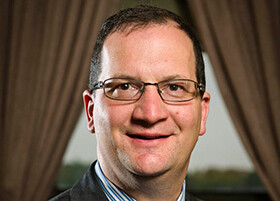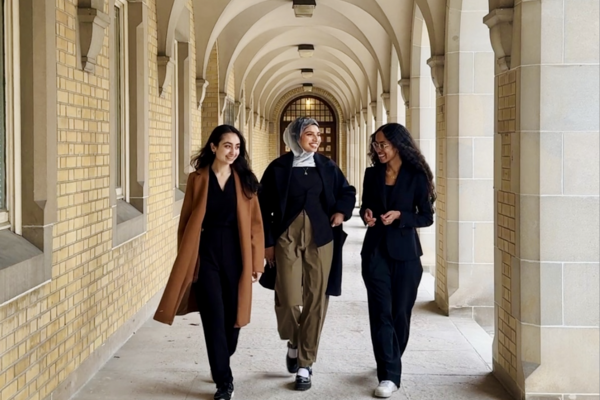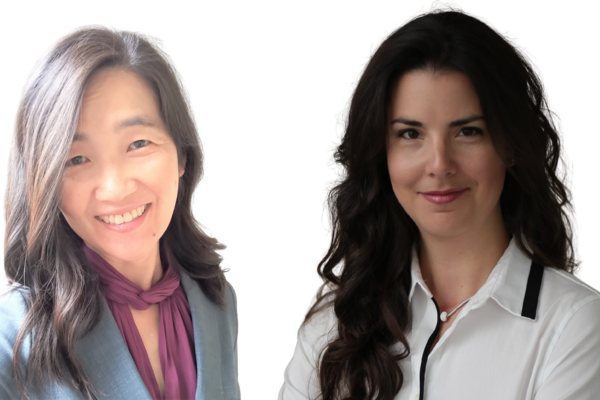Mobile Menu
- Education
- Research
-
Students
- High School Outreach
- Undergraduate & Beyond: Community of Support
- Current Students
- Faculty & Staff
- Alumni
- News & Events
- Giving
- About

University of Toronto Professor Kevin Imrie has been chosen as the President-Elect of the Royal College of Physicians and Surgeons of Canada — the organization responsible for accrediting residency programs and certifying medical specialists in Canada. He is the Physician-in-Chief of the Department of Medicine at Sunnybrook Health Sciences Centre and Vice-Chair of Education in U of T’s Department of Medicine and undertook his new responsibilities October 18.
The vision of the Royal College, Imrie says, “…is ‘the best health for all. The best care for all’ through effective training and high standards for our medical specialists.” More recently, the Royal College has become known as a stronger voice for change, including actively contributing and leading to debates about issues that are critical to residents.
In his new role, Imrie will work with Royal College President Dr. Cecil H. Rorabeck and CEO Dr. Andrew Padmos to oversee a transformation in specialty medical education.
“The model for medical education in Canada is over a hundred years old,” says Imrie. “It’s rooted in a time-based approach; we identified a set time for studying a particular specialty and after that time, you were generally considered qualified. Our goal now is to move to a competency-based model that sets out the core understandings and skills a doctor must have in each specialty. That allows for training that is more learner-centered, better designed to address societal health needs and patient outcomes.”
This approach — known as ‘Competence by Design (CBD)’ — will allow doctors to proceed at a pace that best meets individual learning needs, Imrie explains, while also providing more flexibility in recognizing foreign training. The first phase of the project 'CanMEDS 2015' will establish the framework for this new system and is already underway. CBD is a multi-year initiative that focuses on the learning continuum from residency to retirement.
The shift to competency-based medical education is not unique to Canada, though the work of the Royal College has quickly established Canada as a leader in the field.
“Canada has a strong reputation for the high quality of our medical education and through our engagement with 26 different counties, we are in a position to be an example to the world,” Imrie states.
Imrie has served in a variety of educational leadership positions, including as the Vice President of Education for the Royal College, Associate Dean of the Faculty of Medicine for Admissions and Evaluation, Director of Postgraduate Programs in the Department of Medicine, as well as Core Internal Medicine Program Director and Hematology Training Program Director. An award winning educator, Imrie is the recipient of the Faculty of Medicine Award for Excellence in Postgraduate Medicine Education and the Department of Medicine’s Teacher of the Year Award.
The opportunity to help reinvent medical education drew Imrie to this role.
“This is truly a transformative time in medical education and the chance to be involved and help give it shape was too good to pass up,” he says.
Imrie says there are challenges too. A recent report by the Royal College explored the growing number of medical specialists who are unable to find work.
“While there are many areas where we still do not have enough specialists to meet the demands, there are a small number of areas where we are facing a surplus,” says Imrie, noting these can fluctuate over time. Part of the answer, he says, rests in the competency-based training and certification that will provide doctors with greater flexibility to become certified specialists in areas of greatest need.
“We need to allow doctors to adapt their skills to meet our changing needs,” Imrie says.
Launching the competency-based method of training and evaluation will be Imrie’s focus during his leadership, which includes a one-year term as President-Elect, followed by a two-year term as President and a further one year as Immediate Past President. CanMEDS 2015 will launch September 2015.


